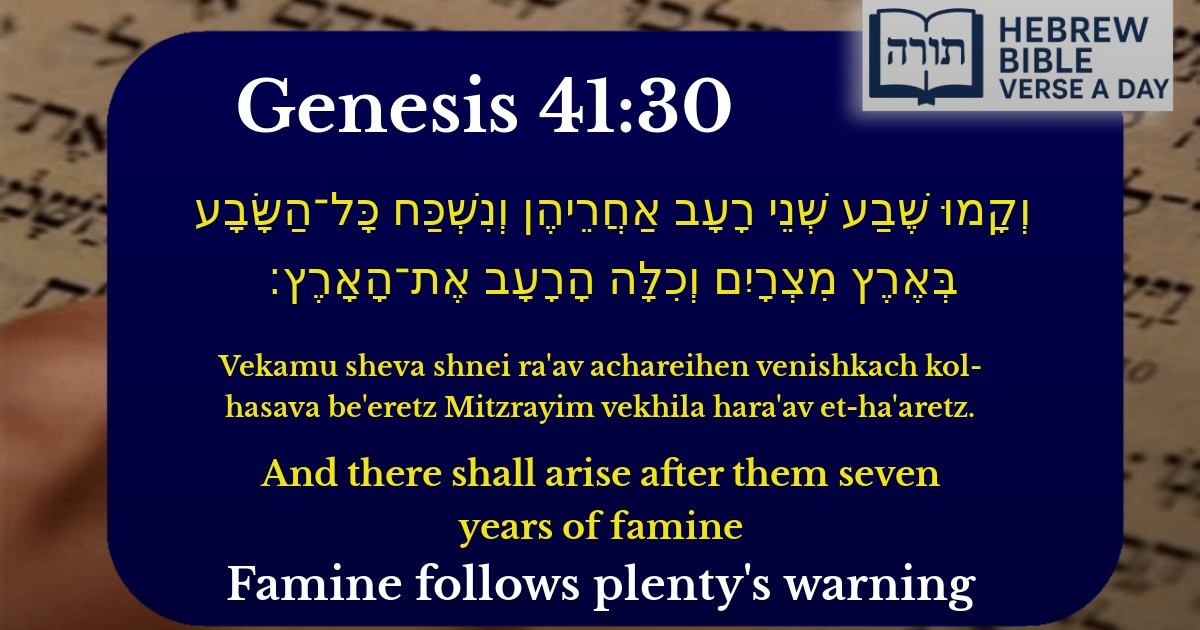Join Our Newsletter To Be Informed When New Videos Are Posted
Join the thousands of fellow Studends who rely on our videos to learn how to read the bible in Hebrew for free!
Hebrew Text
וְקָמוּ שֶׁבַע שְׁנֵי רָעָב אַחֲרֵיהֶן וְנִשְׁכַּח כָּל־הַשָּׂבָע בְּאֶרֶץ מִצְרָיִם וְכִלָּה הָרָעָב אֶת־הָאָרֶץ׃
English Translation
And there shall arise after them seven years of famine
Transliteration
Vekamu sheva shnei ra'av achareihen venishkach kol-hasava be'eretz Mitzrayim vekhila hara'av et-ha'aretz.
Hebrew Leining Text
וְ֠קָ֠מוּ שֶׁ֜בַע שְׁנֵ֤י רָעָב֙ אַחֲרֵיהֶ֔ן וְנִשְׁכַּ֥ח כׇּל־הַשָּׂבָ֖ע בְּאֶ֣רֶץ מִצְרָ֑יִם וְכִלָּ֥ה הָרָעָ֖ב אֶת־הָאָֽרֶץ׃
וְ֠קָ֠מוּ שֶׁ֜בַע שְׁנֵ֤י רָעָב֙ אַחֲרֵיהֶ֔ן וְנִשְׁכַּ֥ח כׇּל־הַשָּׂבָ֖ע בְּאֶ֣רֶץ מִצְרָ֑יִם וְכִלָּ֥ה הָרָעָ֖ב אֶת־הָאָֽרֶץ׃
🎵 Listen to leining
Parasha Commentary
📚 Talmud Citations
This verse is quoted in the Talmud.
📖 Ta'anit 10b
The verse is referenced in a discussion about the interpretation of dreams and the seven years of plenty and famine in Egypt.
📖 Megillah 14a
The verse is mentioned in the context of discussing the prophetic abilities of Joseph and the significance of his dreams.


Interpretation of the Verse
The verse (Bereshit 41:30) describes Pharaoh's dream, interpreted by Yosef, foretelling seven years of famine following seven years of plenty. This prophecy was a divine warning to prepare for the impending hardship.
Rashi's Commentary
Rashi explains that the phrase "וְנִשְׁכַּח כָּל־הַשָּׂבָע" ("all the plenty shall be forgotten") means that the years of famine will be so severe that people will forget the previous abundance. Even the stored grain from the years of plenty will seem insufficient due to the intensity of the hunger (Rashi on Bereshit 41:30).
Rambam's Perspective
Rambam (Hilchot Ta'anit 1:1-3) discusses how famine is one of the calamities that should prompt communal fasting and repentance. The seven years of famine in Egypt served as a test and a lesson in divine providence and human responsibility—highlighting Yosef's wisdom in storing grain during the years of plenty.
Midrashic Insights
Lessons from the Verse
The verse teaches the importance of foresight and preparation, as exemplified by Yosef's advice to Pharaoh. Additionally, it underscores the idea that hardships are often preceded by warnings, urging people to act with wisdom and trust in divine guidance.